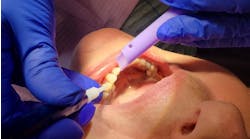LOUISVILLE, Kentucky--Faculty at the University of Louisville overestimate the health risks of smokeless tobacco, with most placing it at the same risk level as cigarettes.
Survey results from nearly 600 faculty members showed that 97% percent of respondents considered cigarettes as high risk for several health domains--general health, heart attack/stroke, all cancer, and oral cancer. The majority of survey-takers also perceived smokeless tobacco as high risk, with 80% of respondents believing it has equal or higher risk than smoking for oral cancer.
Faculty at the university's Health Sciences Center had somewhat more accurate risk perceptions than faculty on the university’s Belknap campus; however both groups overestimated the risks--particularly for oral cancer.
Research conducted in Sweden and the United States demonstrates that smokeless tobacco use carries far fewer health risks than smoking, even for oral cancer. According to one study published in 2009, approximately 4,660 men in the United States died in 2005 from oral cancer attributable to cigarette smoking. If these smokers had used smokeless tobacco instead, there would have been about 109 deaths, representing a 98% reduction.
The study was conducted in collaboration with the School of Public Health and Information Sciences, Kent School of Social Work, and Brown Cancer Center. Nicholas Peiper, a doctoral student in the School of Public Health and Information Sciences, led the study to assess tobacco risk perceptions among the highly educated.
“This study is not about getting people to use smokeless tobacco, it’s about providing the public with accurate information,” said Peiper. “So if you’ve been smoking for 20 years and find you can’t quit. This is an alternative with fewer risks.”
Peiper said the study demonstrates the need for better education about the risks of tobacco use and for communication of accurate information by health professionals and organizations. Research cited in the study points out medical, nursing, and dental school graduates may have inadequate training to provide effective tobacco education and intervention.
The study, university faculty perceptions of the health risks related to cigarettes and smokeless tobacco, was published March 2010 in Drug and Alcohol Review.
The article can be found at www3.interscience.wiley.com/journal/123243994/abstract.
To read more about smokeless tobacco, go to www.dentistryiq.com/index/display/article-display/9368613348/articles/dentisryiq/industry/2010/04/aspen-dental_announces.html.
To comment on this topic, go to community.pennwelldentalgroup.com/.





